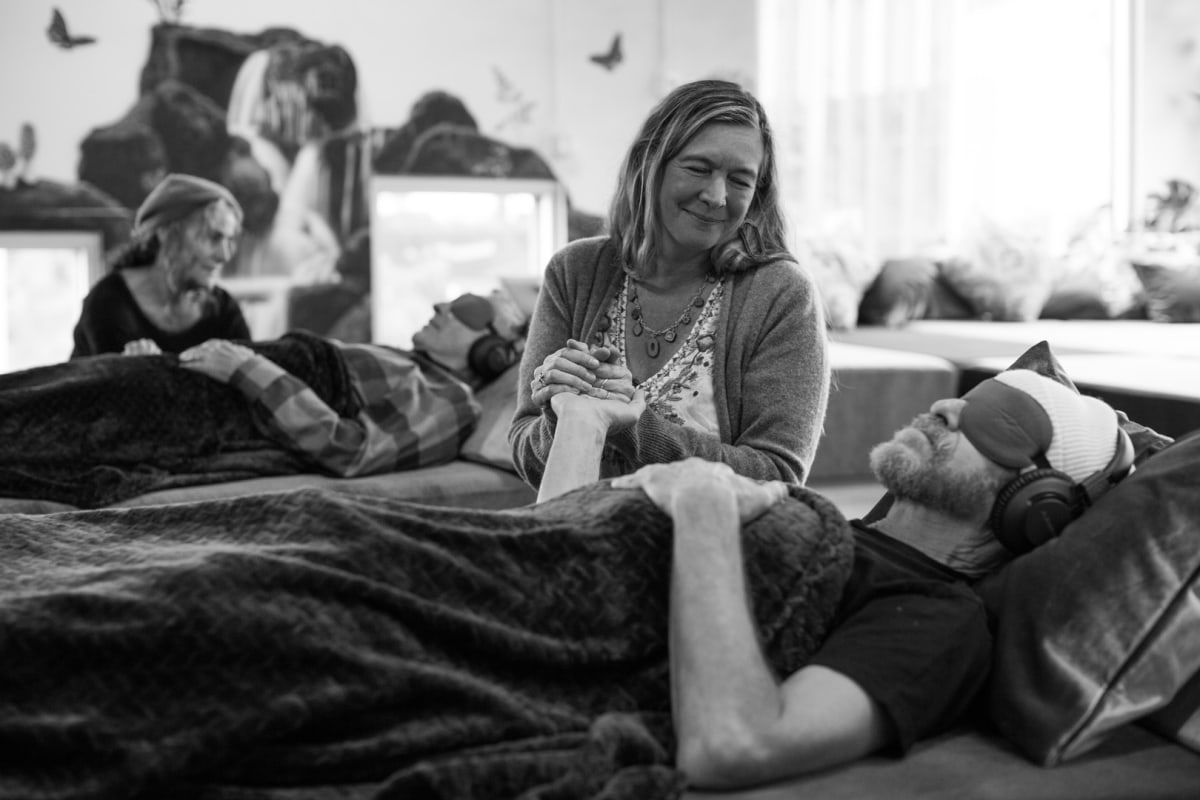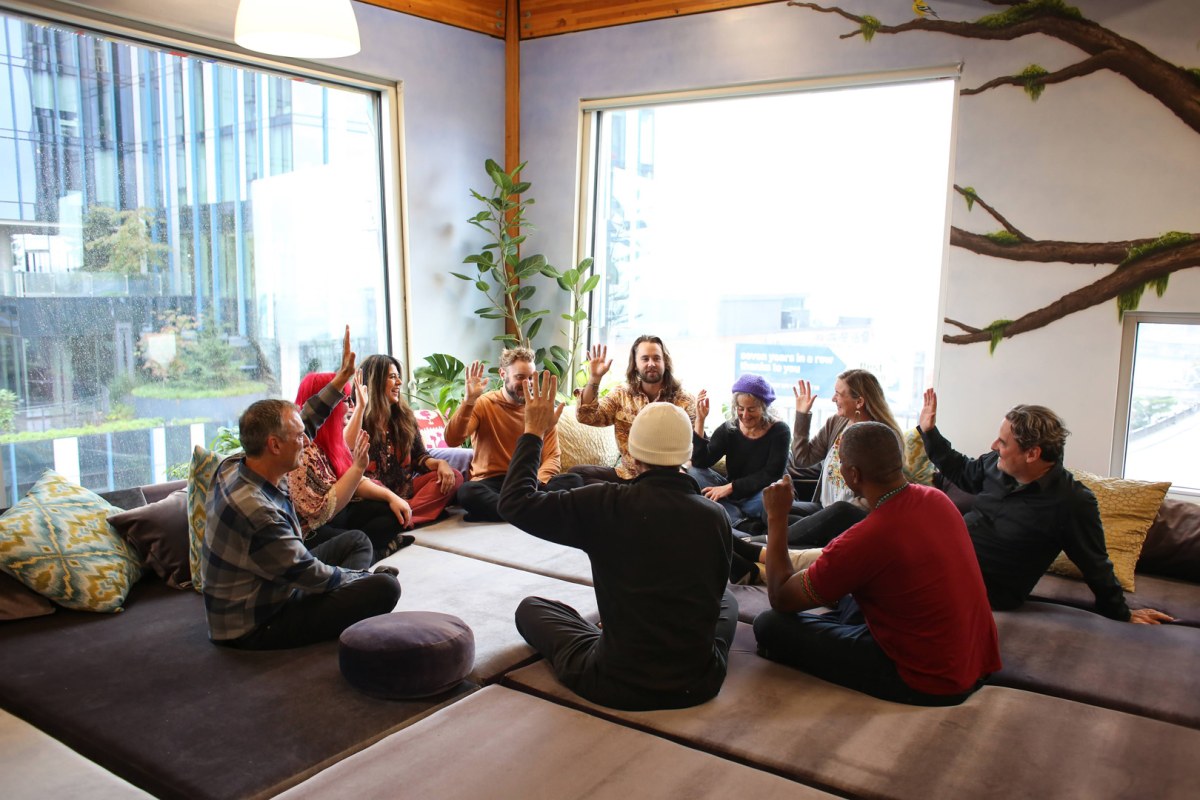
Toward the end of Dee Dee Patterson’s training to become a licensed psilocybin facilitator in Oregon, she took her own hallucinogenic trip.
A 46-year-old corporate healthcare director from Hood River, Patterson had used psilocybin several times before, but always on her own. And though a psilocybin journey is not required to become a facilitator, many trainees think it’s wise to experience the magic of mushrooms first hand.
At InnerTrek, a psilocybin service center in southeast Portland, her facilitator held her hand for “lift-off”—the first ten minutes that the mushrooms take effect, when patients sometimes become apprehensive—and checked in with her periodically throughout her six-hour journey, offering water. Patterson’s intentions for the journey—to resolve emotional trauma from a failed relationship and from the death of her father—were both realized.

[Photo: InnerTrek]
“I had a visit from my dad,” she tells me three months later, her voice cracking. “He helped me see some really beautiful things that he never expressed to me when he was alive.” Later, she was visited by a court jester. “In these journeys you see some wild things!” Her interpretation was that she needs to invite more play into her life. “I’m a very serious person,” Patterson says. “The jester was a lighthearted reminder to not take myself so seriously.”
When Oregonians resoundingly voted for Measure 109 (55.75% for; 44.25% against) in 2022, Oregon became the first state to legalize the use of psilocybin, a psychedelic compound found in more than 200 species of mushrooms. But you can’t just waltz into a dispensary and purchase magic mushrooms the way you can a joint or pot brownies. The authors of Measure 109 had read the science and determined that the new law should require anyone wanting to purchase mushrooms do so at a facility under the supervision of a licensed facilitator. The law also requires that clients be 21 or over, and they must complete a health screening. Research suggests psilocybin may help address depression, anxiety, post-traumatic stress disorder, and addiction as much if not more effectively than the medicines or treatments now in use.
So far, 22 clinics have opened in Oregon—and they crisscross the state, from Ashland to Bend. The licensing process, which consists of three 12- to 15-page forms and two checklists, is appropriately thorough but not unwieldy. However, it is pricey. After a non-refundable $500 application fee, a service center license costs $10,000 per year, unless the owner qualifies for a reduced license fee ($5,000).
Since it opened on January 2nd, InnerTrek has been one of the most talked-about of Portland’s legal psychedelic service centers. (The company also runs the facilitator training that Patterson completed.) This is partly because it was co-founded by Tom Eckert, a psilocybin activist and clinical therapist, who along with his late wife, Sheri Eckert, was one of the architects of Ballot Measure 109. It’s also because of its central location at the foot of the Burnside Bridge—the crossroad between North and South Portland, and East and West Portland.

[Photo: InnerTrek]
It doesn’t hurt that InnerTrek is located in the iconic Fair-Haired Dumbbell building, clad in a colorful psychedelic mural by artist James Jean. The whimsical design continues inside InnerTrek’s wood-floored space, with life-sized tree murals festooned with mushrooms; custom-made “journey beds,” for lounging on during your trip; a riot of plants; and windows with views of bridges and the city skyline. It feels a bit like an urban treehouse.
InnerTrek’s location on the 6th floor of the Fair-Haired Dumbbell building is not coincidental. Developer Kevin Cavenaugh at Guerrilla Development took advantage of a provision in the 2012 JOBS Act that allowed non-accredited investors (i.e. people worth less than $1 million) to invest modest amounts in private companies. This means the building was entirely financed by small investors, rather than a traditional bank loan, which makes it an ideal spot for a psilocybin treatment center because (since the drug is still federally illegal) the can’t be located in buildings that are owned by a federally-insured bank.

[Photo: InnerTrek]
Nathan Howard, director of operations at InnerTrek, says the Fair-Haired Dumbbell is a perfect fit. “The building is one of the first big examples of a democratized form of real estate, where people share in the wealth,” Howard says.
The center has also developed relationships with KEX, the Icelandic hotel across the street, where patients can stay for a discounted rate and Knot Springs, a high-end spa in an adjacent building, where clients can relax prior to their journey. At press time, InnerTrek had 1,500 people from all corners of the country on its waitlist. The whole undertaking of preparing for a psilocybin trip takes 2-3 weeks and the InnerTrek staff is still streamlining the process. For this reason, the center is only averaging one client per day for one-on-one sessions or 8-10 clients per day for group sessions. The center has seen 50 clients since it opened in January.
“It’s very exciting,” says Eckert of the center’s official opening. “There are transformative experiences occurring in the space. People speak of what happens there as life changing, creating new beginnings, new outlooks.”

[Photo: InnerTrek]
The state of affairs
Oregon isn’t the only state pursuing the legalization of psilocybin–others, like Colorado and Massachusetts, are following suit. And these states are looking to Oregon to see what is and isn’t working in the new regulatory landscape. The leaders at InnerTrek are sharing lessons learned with activists in other states to help them navigate their own regulatory processes.
Howard, who was an advisor for the Measure 109 campaign, is also the executive director at the Sheri Eckert Foundation, named after Tom’s late wife. The Foundation raises money to ensure equitable access to psilocybin education and services. Wearing this hat, Howard serves as an unpaid consultant to activists in other states who are trying to pass ballot measures like Oregon’s.
In Colorado, voters approved Proposition 122, the Natural Medicine Health Act, in November 2022. “They’re in their two-year rule advisory process,” says Howard. “Hopefully by July they’ll have rules in place [for psilocybin] and they’ll be where we were in January of 2023.” But Colorado’s law, which decriminalized three hallucinogenic plants in addition to psilocybin and psilocin (a psilocybin alkaloid), will also eventually add these other “natural medicines” to the regulatory program. Ibogaine, found in the root bark of the iboga plant, will be added to the state-regulated program upon the recommendation of the advisory board, while dimethyltryptamine (DMT) and mescaline (excluding peyote) will have to wait until at least June 2026, according to lawyer Joshua Kappel, founding partner at Vicente law firm and one of the key authors of Prop. 122. In Massachusetts, where six cities have already decriminalized psychedelics, a ballot initiative is currently in the state legislature and will likely go before voters later this year. Modeled after Oregon and Colorado’s measures, Massachusetts’ initiative calls for a state commission to license “psychedelic therapy centers” staffed by trained facilitators.
Howard meets regularly on Zoom with advocates around the country who share what’s working and not working in Oregon and Colorado. Some of the groups that these calls join include Rick Doblin’s Multidisciplinary Association for Psychedelic Studies (known simply as MAPS in psychedelic circles) and the Oregon and Colorado-based Healing Advocacy Fund, a nonprofit that focuses on psilocybin education, advocacy, and fundraising. Big-name psychedelic and drug policy reform supporters like Mark Zuckerberg, Kimbal and Christiana Musk, TOMS founder Blake Mycoskie, and David Bronner, “Cosmic Engagement Officer” of Dr. Bronner’s, are expected to pour funding into the Massachusetts initiative—the first of its kind on the east coast. Howard predicts that members of entrepreneur (and former Zuckberg roommate) Joe Green’s Psychedelic Science Funders Collaborative will also financially support the Massachusetts measure. (The PSFC has also funded research into MDMA, which is expected to be cleared by the FDA later this year.)
In early October, Governor Gavin Newsom vetoed a bill that would’ve decriminalized psychedelic drugs In California, but released a statement that signaled he was open to creating a regulatory framework in the future, once “guardrails” around dosing and treatment are set. The Sheri Eckert Foundation will work with Newsom’s team later this year to create a program similar to Oregon’s for psychedelics.
Oregon’s approach to regulation is helping inform how the industry will take shape elsewhere. Unlike with cannabis and ketamine, psychedelics will likely remain a small, less capital intensive industry. “I think psychedelics get compromised in a corporate sphere,” Eckert says, “I don’t think it’s a big VC attraction in Oregon, partly because of how we set up the [regulations].” At least not yet. The state requires that over half of the ownership interest in each psilocybin business be held by a person who can prove Oregon residency for two or more years—but that provision expires in January of 2025. The regulations also limit each business to five treatment centers and one training program. These regulations help to avoid a too-fast expansion of the sort that felled Field Trip, the Canadian ketamine-clinic company that burned through $100 million Canadian before imploding in March last year.
InnerTrek is entirely self-financed. Eckert won’t disclose how much his start-up costs were, but says, “it was fairly steep.” At the moment, he can’t imagine expanding to more than one treatment center. “If we were to have done five…” Eckert tells me, his voice trailing off. “It would’ve been crazy complex.” Instead, he’s focusing on making InnerTrek a sanctuary with intuitive facilitators. “It’s important that we have the right orientation to what this work is. It’s really sacred and delicate,” he says. “It requires meshing as a team and growing into the role. You really have to be a stable, open, caring human being to do this work as a facilitator.”

[Photo: InnerTrek]
The price of treatment
One of the challenges in Oregon is making psilocybin services more affordable and accessible. Because the legal program is meant to be self-sustaining, the license fees—both to become a facilitator and to open a treatment center—are high. “License fees are 20 to 100 times higher than the licenses for people who practice [western] medicine,” says Howard, noting that an DEA license (which you need to dispense pharmaceutical drugs) is just $300 per year. In Oregon, a psilocybin facilitator license is $2,000 annually (and that’s not including the training, which can run as high as $10,000). That and the $10,000 service center license fees are out of reach for many. “It makes no sense and it’s based on a broken model,” says Howard.

[Photo: InnerTrek]
This means that facilitators will often pass these fees on to the clients that they serve. At InnerTrek, it costs $1,800 for an individual trip or $1,200 to do it as part of a group. The fees include a lengthy health screening, two preparation sessions, the actual mushrooms (produced at Satori Farms, in Southeast Portland), six hours of a supervised trip, and up to two optional “integration sessions” a few days later. “The whole thing takes two-to-three weeks,” says Eckert. (The health screener and the two preparation sessions can be done digitally or online.)
Some treatment centers, like Bendable in Bend, where the “psilocybin wellness program” costs $3,000, offer full scholarships for need-based clients, as funding allows. (Bendable only offers scholarships to Oregonians at the moment). Other treatment centers have sliding scales. But Howard thinks it’s only a matter of time before many center owners realize they can’t afford this kind of largesse, righteous though it is.
“It’ll be wild,” Howard cautions. “The first year of business, people could be very generous and then they’ll be hit by 280E,” he says, referring to the section of the IRS tax code that forbids any federally scheduled drug businesses from deducting expenses on their U.S. taxes. “Then they’ll either go away or realize that they need to raise money,” he adds.
Many Oregonians—those who are on the state Medicaid program or just those who are used to the lower cost of shrooms procured from illicit sources—are shocked by the steep treatment center prices. To help off-set the high cost, Howard just launched a campaign at the Sheri Eckert Foundation to raise $1 million this year for an Oregon fund where low-income clients can apply to access funds for psilocybin services. “Some donors want their $50,000 spread to 25 people who were recently incarcerated youth. Others want to focus on LGTBQ+ folks, and many other funders will want to contribute to a general access fund so anybody can apply,” Howard says.
There are only three reasons that would disqualify someone from getting psilocybin treatment in Oregon: if they have taken lithium in the past 30 days; if they have a history of active psychosis; or if they have current thoughts of harming themselves or others. Doctor Franklin King IV, a psychiatrist and director of training and education at the Center for the Neuroscience of Psychedelics at Massachusetts General Hospital has publicly stated that psychedelics can destabilize previously stabilized psychiatric patients. This is one of the reasons it’s vital to screen—and to have a trained professional with each person who is ingesting the mushrooms.
InnerTrek is going a step further by strongly discouraging anyone who has schizophrenia, major depressive disorder with psychotic features, bipolar disorder, or other mental health issues to not continue with the intake process. The list of contraindications on InnerTrek’s website is, in fact, quite long, and even includes those with heart conditions, kidney disease, or even those with a first degree relative with schizophrenia, bipolar disorder or any psychotic or dissociative disorder. That said, when I ask Eckert about these contraindications he sounds more open-minded, emphasizing that their health and safety director, Seth Mehr, M.D., evaluates each client’s digital screener on a case-by-case basis. “We work with clients to ensure safety, which sometimes means delaying services until certain safety conditions are met,” Eckert says. “Some chronic conditions make it unsafe to move forward.”

[Photo: InnerTrek]
For people like Eckert and Howard, it feels nothing short of miraculous that transformative experiences with psilocybin are happening at InnerTrek every day. “There was so much work on all the different steps—whether it was campaigning or building a training program. All of these things in their own right were massive undertakings,” Eckert says. “They were all leading up to this simple idea of creating a space where people can come and experience a special state of consciousness under facilitation and care.”
One of the reasons Patterson, the facilitator from Hood River, wanted to take a trip as part of her six-month training program is because she thought it would give her a deeper understanding of how to serve future clients. “Sometimes these experiences can be so difficult to explain in words,” she says.
Nonetheless, I ask her to try.
“Every time I experience the medicine, it’s like going home,” says Patterson. “Your heart—it just gets blown wide open. All of that shit that we deal with on a daily basis just to get through life? It all becomes like ‘oohhhh! It’s not that bad, it’s actually beautiful.’”
Source:Hannah Wallace , www.fastcompany.com, [publish_date
Source Link